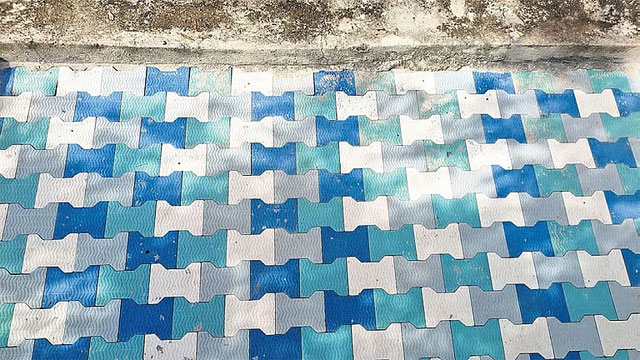Daijiworld Media Network - Kalaburagi
Kalaburagi, Aug 2: The popular phrase ‘turning waste into wealth’ has found a striking example in Kalaburagi, where discarded plastic is now being transformed into colourful decorative tiles — a sustainable innovation that is catching on fast.
Household items like plastic containers, tins, old tyres, and wooden scraps are often thrown away without a second thought. But with a bit of creativity and patience, such waste can be repurposed into useful and attractive decor.

Plastic, having become an inseparable part of daily life due to its low cost and accessibility, also contributes heavily to pollution — with Asia leading in plastic waste generation. In India, plastic waste poses a serious challenge to developing cities.
In a bid to counter this issue, the Wadi town municipal council in Kalaburagi district has launched an innovative solution. It has begun producing vibrant paving tiles from plastic waste such as carry bags, bottles, and packaging materials. These eco-friendly tiles are gaining popularity in the region.
Previously, all waste, including used plastic collected from households and commercial establishments, was sent directly to solid waste management sites without segregation, which led to increasing pollution.
Recognising this gap, municipal officials and elected representatives explored alternative solutions. This led to the idea of producing tiles from waste plastic. Partnering with the Kalaburagi-based NGO Revive Waste Management, the Wadi municipality launched a joint venture about a year ago, said municipal CEO Fakruddin.
From the 23 wards in Wadi, the municipality collects approximately 14.5 tonnes of solid waste daily — including nearly 350 kg of plastic waste. After segregation, the plastic is cleaned using a dust-removal machine to eliminate fine particles and impurities.
The cleaned plastic is then sent by the NGO to a tile factory in Hyderabad. Once manufactured, the tiles are returned to Wadi municipality. These durable and colourful tiles are now being used for decorative and construction purposes, including road work.
Deputy commissioner Fauzia Tarannum, who praised this eco-friendly initiative, confirmed that the district administration would support the municipality in setting up a local factory. She has directed officials to submit a proposal soon.
Once established, this unit could process plastic waste not just from Wadi but from across Kalaburagi district. The NGO currently supplies 125 paver blocks or tiles for every tonne of processed plastic. So far, the municipality has received 200 paver blocks and 200 tiles from the NGO, which have been used to construct a pedestrian pathway in front of the civil workers’ rest house in Wadi.
“We are awaiting guidance from senior officials regarding the expanded use of these tiles and paver blocks,” Tarannum added.
Naveenchandra, head of Revive Waste Management, stated, “If land is allocated free of cost, our organisation is ready to establish the factory in Wadi.” He estimated the project cost at Rs 75 lac, which could be completed within three months.
“Our tiles are eco-friendly, stronger than traditional cement-based products, and almost unbreakable. Made of 80% mixed plastic and 20% sand dust or glass powder, they have a lifespan of over 50 years and can withstand loads up to 60 tonnes,” he explained.